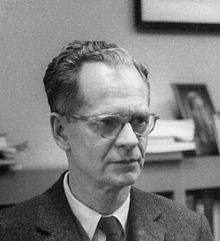B F Skinner
| B. F. Skinner | |
|---|---|

Skinner at the Harvard Psychology Department, c. 1950
|
|
| Born |
March 20, 1904 Susquehanna, Pennsylvania |
| Died | August 18, 1990 (aged 86) Cambridge, Massachusetts |
| Nationality | American |
| Fields | Psychology, linguistics, philosophy |
| Institutions |
University of Minnesota Indiana University Harvard University |
| Alma mater |
Hamilton College Harvard University |
| Known for |
Operant conditioning Operant conditioning chamber Radical behaviorism |
| Influences |
Charles Darwin Ivan Pavlov Ernst Mach Jacques Loeb Edward Thorndike William James Jean-Jacques Rousseau Henry David Thoreau |
| Notable awards | National Medal of Science (1968) |
| Spouse | Yvonne (Eve) Blue (-after 1990) |
| Signature | |
Burrhus Frederic Skinner (March 20, 1904 – August 18, 1990), commonly known as B. F. Skinner, was an American psychologist, behaviorist, author, inventor, and social philosopher. He was the Edgar Pierce Professor of Psychology at Harvard University from 1958 until his retirement in 1974.
Skinner considered free will an illusion and human action dependent on consequences of previous actions. If the consequences are bad, there is a high chance the action will not be repeated; if the consequences are good, the actions that led to it being repeated become more probable. Skinner called this the principle of reinforcement.
To strengthen behavior, Skinner used operant conditioning, and he considered the rate of response to be the most effective measure of response strength. To study operant conditioning he invented the operant conditioning chamber, also known as the Skinner Box, and to measure rate he invented the cumulative recorder. Using these tools, he and C. B. Ferster produced his most influential experimental work, which appeared in the book Schedules of Reinforcement.
Skinner developed a philosophy of science that he called radical behaviorism, and founded a school of experimental research psychology—the experimental analysis of behavior. He imagined the application of his ideas to the design of a human community in his utopian novel, Walden Two, and his analysis of human behavior culminated in his work, Verbal Behavior. Skinner was a prolific author who published 21 books and 180 articles. Contemporary academia considers Skinner a pioneer of modern behaviorism, along with John B. Watson and Ivan Pavlov. A June 2002 survey listed Skinner as the most influential psychologist of the 20th century.
...
Wikipedia
